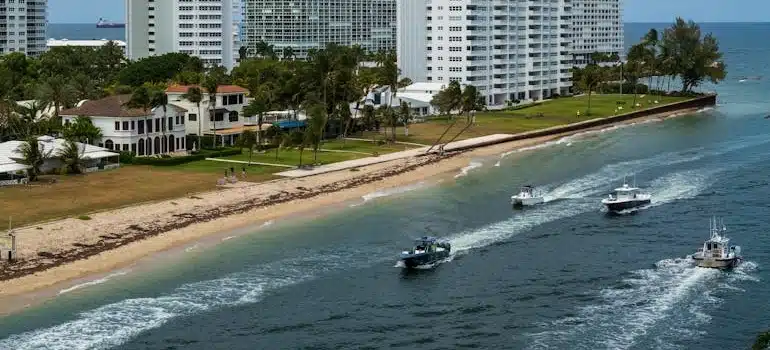Reasons why families should consider moving to Fort Lauderdale
Fort Lauderdale, Florida, has long been a sought-after destination for those seeking sunshine, beaches, and a vibrant community. In recent years, it’s become increasingly popular among families looking for a warm, welcoming place to settle down. Hence, this Pro Movers Miami article explores key reasons why families should consider moving to Fort Lauderdale, backed by the latest data to help you make an informed decision.
Cost of living and affordability
Relocating with a family means budgeting carefully. Fort Lauderdale’s cost of living is above the U.S. average, mainly due to housing costs, but it still offers financial perks that can ease the burden for families:
- Overall Costs: Fort Lauderdale’s overall cost of living index is about 10–22% higher than the national average. In practical terms, residents spend roughly $6,238 per month on living expenses (housing, transportation, groceries, healthcare, etc.) on average.
- Housing: Housing is the biggest expense. The median home price in Fort Lauderdale is around $520,000, compared to about $338,000 nationally. Renting is also pricey – as of early 2025, the median rent is about $1,843 per month for all unit sizes.
- Everyday Expenses: Other costs like groceries and utilities are slightly above average (index ~107 for groceries, meaning ~7% higher than the U.S. norm). Furthermore, transportation can be 30% higher than the national average, partly due to the need for cars and gas prices. On the bright side, healthcare costs are roughly on par or even a bit lower than the U.S. average in Fort Lauderdale.
- Florida Tax Advantages: Don’t forget that Florida has no state income tax, which is a major financial benefit for working parents. Property taxes in Florida are also moderate, around 0.8% of a home’s value on average, lower than in many Northeast states.
These tax perks, combined with Fort Lauderdale’s slightly lower cost of living compared to nearby Miami, can make the financial equation of relocating here with movers in Fort Lauderdale more family-friendly.
As you can see, Fort Lauderdale isn’t the cheapest place to live, but many families find the higher cost worth it for the lifestyle and benefits.

Quality education and schools
For families moving to Fort Lauderdale, the quality of local schools is a top priority. Conveniently, the city shines in this area, offering a range of educational options.
Public Schools
Fort Lauderdale is served by Broward County Public Schools (BCPS), which is the 6th largest public school district in the U.S.. A large district means a variety of programs – from neighborhood schools to magnet and charter programs focusing on STEM, arts, or Montessori education.
Many Fort Lauderdale-area public schools earn high marks. For example, Bayview Elementary School in east Fort Lauderdale ranks in the top 5% of all Florida schools, with around 85–88% of its students proficient in math and reading (far above the state average of ~52%). As a result, there’s a strong academic performance you can find in the area after relocating your family with the help of the moving companies Broward County offers.
Private and Charter Schools
In addition to public schools, Fort Lauderdale has numerous private schools and high-performing charter schools. Notable examples include:
- Pine Crest School, a prestigious private K-12 known for its academics (ranked among the top private schools nationally), and
- St. Thomas Aquinas High School, renowned for both its scholastics and athletics.
There are also charter options like Somerset Academy and others that consistently get high ratings. Families here have the freedom to choose an educational path that fits their child’s needs.
Higher Education
While your kids may be far from college, it’s worth noting the area’s educational environment. Broward College and Nova Southeastern University are in the region, and nearby Miami offers even more colleges. This means plenty of educational resources (libraries, museums, youth programs) are available to enrich your family’s learning experience outside of school.
Why it matters
Fort Lauderdale’s range of quality schools – whether public, private, or charter – means your children can get a great education here. The presence of top-ranked programs and large school choice offerings can give parents peace of mind that their kids will be in good hands academically.
Safety and crime: What families should know
Safety is a common concern for any family moving to a new city with local movers in Florida. It’s important to have a clear picture of Fort Lauderdale’s crime rates and how the city is addressing safety.
Overall crime rate
Fort Lauderdale historically has had higher-than-average crime rates. The most recent FBI data (2023) showed about 4,785 total crimes per 100,000 people, which is roughly 105% above the national average crime rate. In other words, crime in Fort Lauderdale is about double the U.S. average rate per capita. This earned the city a low safety ranking relative to other cities nationally.
Violent vs. property crime
Most of the incidents are property crimes (theft, burglary, vehicle theft). The violent crime rate in Fort Lauderdale was approximately 4.2 incidents per 1,000 residents in 2024 (around 420 per 100k). To put that in perspective, the chance of being a victim of violent crime is about 1 in 238, or 0.4%, in a year.
Property crime is more common, with a rate of about 37 per 1,000 residents (1 in 27 chance in a year). Vehicle theft, in particular, is noted as higher here than in most U.S. cities.
Trends
The city is aware of these challenges. There have been renewed efforts by local leaders to prioritize public safety. Notably, Fort Lauderdale saw an increase in police calls and a rise in assault cases in 2023. They were leading to more community policing and safety initiatives in affected areas.
Early data for 2024 indicate authorities are working to curb these trends. It’s also worth noting that crime tends to be localized – touristy areas and certain neighborhoods see more incidents, while many residential areas remain relatively quiet.
Safest areas
Families can take comfort that several neighborhoods in Fort Lauderdale have lower crime and a very family-friendly feel. For instance, areas like Coral Ridge, Victoria Park, and Rio Vista are often cited for their safety and community engagement. These neighborhoods tend to have active residents’ associations, better lighting, and more regular police patrols.
Additionally, many families choose suburbs like Weston or Parkland (west of Fort Lauderdale in Broward County), which boast some of the lowest crime rates in South Florida, along with top-rated schools – albeit with a longer commute to the city.
Practical tips
If you’re moving to Fort Lauderdale with reputable residential movers in Miami, it’s wise to research neighborhood-level crime stats and talk to locals. Choosing the right area (perhaps in the suburbs or the well-established family neighborhoods within the city) can significantly mitigate safety concerns.
Investing in home security systems and participating in community watch programs can also help. Overall, while Fort Lauderdale’s crime numbers are higher than average, many families live safely and happily here by staying informed and involved in their communities.

Family-friendly neighborhoods and housing options
One of the great things about moving to Fort Lauderdale is the variety of neighborhoods, each with its own character, that can suit different family needs. Here are some noteworthy family-friendly neighborhoods in and around Fort Lauderdale.
Coral Ridge
An upscale residential neighborhood known for good schools and beautiful parks. Coral Ridge is dotted with playgrounds and is close to the beach. It offers quiet, tree-lined streets and waterfront homes in some sections. It’s an excellent choice for families, given its reputation for safety and community involvement.
Victoria Park
A charming, historic neighborhood near downtown. Victoria Park is known for its lush greenery and close-knit community feel. Families here enjoy walking to local parks and the nearby shops/cafes on Las Olas Boulevard. The area has a mix of single-family homes and townhouses, often with a lot of character.
Rio Vista
Adjacent to downtown, Rio Vista features quiet, tree-lined streets and well-kept homes. It’s one of the older affluent neighborhoods, very scenic and popular among families who want a peaceful environment while still being near city conveniences. There are several small parks, and the neighborhood’s riverside location means lovely views and opportunities for boating.
Harbor Beach
If living near the ocean is a priority, Harbor Beach is hard to beat. This gated community offers private beach access and is considered one of the most exclusive areas in Fort Lauderdale. Despite its luxury status, it’s family-friendly with parks and a relaxed lifestyle. Security is tight (which adds peace of mind), and kids in the neighborhood often attend top private schools or well-regarded public schools in the area.
Las Olas Isles
This area is a series of finger islands just off downtown – waterfront living at its finest. Many homes have backyard docks for boats. Families here enjoy a combination of city and water life, with the beach and downtown’s cultural attractions minutes away. Wide sidewalks and neighborhood events make it surprisingly neighborly for such a prime location.
Nearby suburbs
In the greater Fort Lauderdale area, cities like Weston, Davie, Plantation, Cooper City, and Parkland are extremely popular with families. For example, Weston (about 20 miles inland) consistently ranks as one of the best places to raise a family in Florida, with A-rated schools and master-planned communities of parks and bike paths.
These suburbs have more of a traditional neighborhood feel (think cul-de-sacs and sports leagues) and often larger yards. The trade-off is a longer drive to the beach or downtown. If you don’t mind a commute, they’re worth considering for their safety and school quality (Weston and Parkland, in particular, boast some of the lowest crime rates and best schools in the state).
Housing options
Across Fort Lauderdale, you’ll find a mix of housing – from high-rise condos and townhomes downtown, to single-family houses in suburban-feel enclaves. Many families opt for single-family homes with yards in neighborhoods like those mentioned above. The housing market is competitive, though: as noted, the median home price is over half a million dollars, and desirable family areas can be higher.
It’s wise to engage a local Realtor and monitor listings if you’re moving to Fort Lauderdale. Quality homes in good school zones or near the beach tend to sell quickly. If buying is out of reach initially, renting a house or a spacious apartment in a good school district can be a stepping stone while you get to know the area.

Outdoor Recreation and Cultural Amenities
One major reason families fall in love with Fort Lauderdale is the outdoor lifestyle and rich array of activities available year-round. In Fort Lauderdale, it’s easy to keep kids entertained and stay active as a family.
Beaches and water fun
Fort Lauderdale is famous for its beautiful beaches, with 24 miles of coastline in Broward County. The city’s main beach (along A1A road) offers warm sand, blue waters, and a more relaxed atmosphere than Miami’s South Beach, great for sandcastle building and family picnics. You can swim nearly year-round thanks to the warm climate. Also, there are coral reefs and a famous shipwreck trail offshore.
Parks and green spaces
Fort Lauderdale boasts numerous parks and playgrounds. The city alone has dozens of parks, from small neighborhood playgrounds to large sports complexes.
A standout is Hugh Taylor Birch State Park, an oasis of nature right between the beach and the Intracoastal Waterway. It has biking trails, kayak rentals, picnic areas, and even a freshwater lagoon – an amazing spot for a weekend family outing.
Other popular parks include Holiday Park (with sports fields and a big playground) and Snyder Park (which even has a splash pad and a dog park). The city has invested heavily in parks. A $200 million improvement bond is funding upgrades to recreational facilities, so playgrounds and sports amenities are only getting better.
Outdoor weather
The local Florida climate is a huge plus for family life. Fort Lauderdale enjoys 246 sunny days per year on average, meaning plenty of opportunity for beach days and outdoor play. Winters are mild (highs ~75°F/24°C), so while the rest of the country hunkers indoors, your kids can be playing outside or you can take a family bike ride in January.
Do keep in mind that summers are hot and humid, with daily afternoon rain showers common in June–September. Local families adjust their schedules in summer to do outdoor activities in the mornings or evenings and enjoy midday in air-conditioned places like museums or malls.
Family attractions
Beyond nature, Fort Lauderdale has a variety of family-friendly attractions and cultural amenities:
- Museum of Discovery & Science (MODS): A fantastic hands-on science museum in downtown Fort Lauderdale, featuring interactive exhibits, an aviation-themed kids’ zone, live animal encounters (like otters and reptiles), and an IMAX theater. It’s a favorite for school field trips and weekend visits alike.
- Broward Center for the Performing Arts: This theater hosts family programming, including children’s theater productions, concerts, and Broadway shows. Exposing your kids to the arts is easy here.
- Libraries & Community Centers: The Broward County library system is excellent, with a large main library downtown and branches in many neighborhoods offering storytimes, tutoring, and activities.
Fort Lauderdale’s community centers (often attached to parks) provide sports leagues, summer camps, and classes for kids (everything from swimming lessons to dance).
Sports and hobbies
If your family loves sports, you’re in luck. There are youth leagues for soccer, baseball, basketball, swimming, tennis, and more. The city’s Aquatic Center was recently renovated – it’s a world-class swimming complex open to the public and hosts competitions. Being on the coast, boating and fishing are also part of the culture. Weekend family fishing trips or sailing lessons for kids are common activities.
Events and festivals
Fort Lauderdale hosts fun annual events like the Winterfest Boat Parade (a dazzling parade of decorated boats down the river each December), beach festivals, food and art festivals, and more. There’s usually something happening on weekends, and many events are kid-friendly.
Cultural diversity
Fort Lauderdale is a diverse city, which means your family can enjoy a wide range of cultural experiences. There are vibrant Caribbean and Latin American communities, among others, so throughout the year, you might stumble upon Caribbean carnival celebrations, food festivals, and cultural parades.
The city’s diversity is reflected in its food scene, too. You can find authentic Jamaican jerk chicken, Peruvian ceviche, Italian gelato, and more. Hence, raising kids in an environment where they can meet people from various backgrounds is a subtle benefit that can broaden their horizons.
In short, Fort Lauderdale makes it easy to lead an active, enriching lifestyle. The combination of sun, surf, nature, and culture means there’s always something for families to do, whether it’s spending a Saturday at the beach, enjoying a park picnic, or exploring a new museum exhibit.

Strong job market and economy
Another key consideration for relocating families is employment. You’ll be happy to know that Fort Lauderdale (and the broader Broward County area) has a robust job market with a growing economy in 2024-2025
Low unemployment
As of late 2024, the Fort Lauderdale area’s unemployment rate was hovering around 3%, which is quite low. For context, this is on par with the Florida state average and indicates essentially full employment.
In fact, Broward County reported just 2.9% unemployment in December 2024, showing strength in the local economy even as some other parts of the country saw slight slowdowns. This also means job opportunities are relatively plentiful.
Job growth
The region has been adding jobs year-over-year. In 2024, Broward County gained about 13,000 new jobs (+1.4% growth) in various sectors. Besides, the Greater Fort Lauderdale Alliance (the local economic development organization) noted that interest from companies looking to relocate or expand in the area remains strong, contributing to ongoing job growth.
This is good news if you’re job hunting. Companies are actively hiring, and new businesses are opening or moving to Fort Lauderdale area with the longstanding commercial movers Miami offers.
Key industries
Fort Lauderdale’s economy is diverse. Some of the major industries and employers include:
- Tourism and hospitality: No surprise here – with the beaches, hotels, and cruise port (Port Everglades), tourism is a backbone. So, if you work in hospitality management, food and beverage, or recreation, there are many opportunities. Port Everglades, by the way, is one of the world’s busiest cruise ports, supporting thousands of jobs itself.
- Marine and yachting: Fort Lauderdale is dubbed the “Yachting Capital of the World.” The marine industry (yacht manufacturing, sales, marine engineering, marina operations, etc.) is huge in this city. The annual Fort Lauderdale International Boat Show is a marquee event that highlights this sector. So, if you have skills in maritime trades or marine engineering, this is a unique niche where Fort Lauderdale excels.
- Healthcare: South Florida has a large healthcare sector. Broward Health and Memorial Healthcare are big hospital systems in the county. Numerous clinics and healthcare services are also catering to the growing population. Healthcare jobs – from nurses and technicians to administrators – are in demand.
- Technology and finance: Fort Lauderdale, along with nearby Miami, has been attracting more finance and tech companies. There’s a growing “Silicon Beach” vibe. Companies like Citrix have long had a presence here, and startups are joining the mix due to Florida’s business-friendly environment. Additionally, many corporate headquarters or regional offices are in the area (AutoNation, DHL Latin America, Spirit Airlines, and others).
- Education and government: With a large school district and several colleges, education is a steady employer. Local government and public safety (police, fire) also contribute a significant number of jobs.
Income and wages
Salaries in Fort Lauderdale tend to be competitive, but not as sky-high as in major Northern metros. The upside is the no-income-tax situation, which can make your take-home pay feel larger.
If you’re moving from a very high cost-of-living city (like New York, Boston, DC, etc.), you might find that while your salary could be a bit lower, the overall affordability and tax savings in Florida improve your family’s quality of life.
Commonly, families moving to Fort Lauderdale from out of state secure jobs in advance or find that transferring within a company to the South Florida office is a smooth route.

Economic outlook
Current trends suggest the job market will stay strong. Florida’s population is still growing (albeit more slowly recently), fueling demand in construction, services, and retail. While there was a slight slowdown in people moving in from other states with interstate moving companies in Miami, Fort Lauderdale’s economy has remained resilient.
In fact, any cooling in migration might ease housing competition a bit while the labor market stays tight, which is a positive if you’re job-searching.
In summary, if you’re a professional moving to Fort Lauderdale, you’ll find a healthy job market and a pro-business climate. Networking is relatively easy. The community isn’t as massive as, say, Miami, so it’s feasible to get to attend local business events.
For trailing spouses or partners, there are ample opportunities across various fields. All of this economic vitality means you can confidently plan a future here, knowing you can build a stable career while your family puts down roots.
Making the move to Fort Lauderdale as a family
Moving your family to Fort Lauderdale is a significant decision, but one that many have found rewarding. As a result, you’ll be joining a community that offers cultural richness and a welcoming environment for kids and adults.
So, prepare on time for a family move and stay informed about neighborhoods, schools, and costs. It is all vital to make moving to Fort Lauderdale lifestyle smooth. Shortly, you’ll be watching your kids build sandcastles on a Fort Lauderdale beach, wondering why you didn’t move here sooner!
